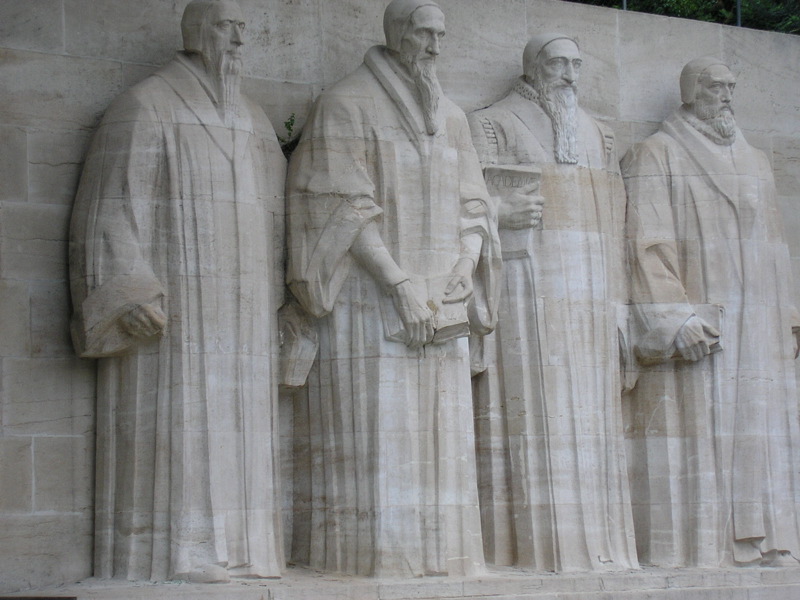This week’s articles follow, but first – a sermon excerpt for all those who haven’t listened to the new Beautiful Eulogy album yet…
1) Fox News’ Highly Reluctant Jesus Follower
But then the pastor preached. I was fascinated. I had never heard a pastor talk about the things he did. Tim Keller’s sermon was intellectually rigorous, weaving in art and history and philosophy. I decided to come back to hear him again. Soon, hearing Keller speak on Sunday became the highlight of my week. I thought of it as just an interesting lecture—not really church. I just tolerated the rest of it in order to hear him. Any person who is familiar with Keller’s preaching knows that he usually brings Jesus in at the end of the sermon to tie his points together. For the first few months, I left feeling frustrated: Why did he have to ruin a perfectly good talk with this Jesus nonsense?
2) To Stave Off Decline, Churches Attract New Members with Beer
With mainline religious congregations dwindling across America, a scattering of churches is trying to attract new members by creating a different sort of Christian community. They are gathering around craft beer.
I think some of this could be a fine para-church ministry, but I’m really concerned about the “ho-hum” approach these people seem to have to the gathering of God’s people and approaching God with reverence.
3) 91 New Thesis Concerning Modern Heresy
Earlier this year, I was going over Martin Luther’s 95 theses, and it occurred to me that many of them apply to the teachings we call the prosperity gospel. The comparison isn’t exact, of course. Prosperity teachers may be popular, but they aren’t part of the majority church as were the teachers Luther opposed. And if you remember from reading Luther’s list, he gives the Pope all due respect, suggesting that he is being misrepresented, not that he is teaching heresy himself. We can’t say that for the preachers of the prosperity gospel.
Here’s my list, taken from and based on Luther’s original–and four theses short. You see today’s Wittenberg doors on the right. They’re bronze, so we’ll have to post new theses with sticky tack. You’ll also see that several of the theses here are Luther’s own statements, taken from this translation.
4) Bolz-Weber’s Liberal, Foul-Mouthed Articulation of Christianity Speaks to Fed-Up Believers
These are the people who put her memoir near the top of the New York Times bestseller list the week it came out in September. They are the ones who follow her every tweet and Facebook post by the thousands, and who have made the Lutheran minister a budding star for the liberal Christian set.
And who, as Bolz-Weber has described it in her frequently profane dialect, “are [mess]ing up my weird.”
A quick tour through her 44 years doesn’t seem likely to wind up here. It includes teen rebellion against her family’s fundamentalist Christianity, a nose dive into drug and alcohol addiction, a lifestyle of sleeping around and a stint doing stand-up in a grungy Denver comedy club. She is part of society’s outsiders, she writes in her memoir, its “underside dwellers . . . cynics, alcoholics and queers.”
Again, I’m OK with some of her attitudes and tactics – I’m all for more authentic people and preachers – but I maintain that a cleaned up person, and a preacher of the Word, should have the sensibility to know that poor language isn’t to be tolerated in the pulpit. Also, I’m generally cautious about anything that classifies itself as “progressive.”
5) A Reading Plan for Augustine’s City of God
The City of God must be read against the backdrop of the sacking of Rome, where critics argued that Rome fell after it embraced Christianity and lost the protection of the gods. Augustine argued that the pagan critics were defining goodness on the basis of the satisfaction of their own desires, rather than the true definition which sees that the ultimate good is found in God alone. Augustine shows that everything in history happens for good purposes, if goodness is rightly understood. He pointed to the pagan desire to return to the city of Rome, and argued that their desire was right but their destination was wrong. True happiness could only come in the heavenly Jerusalem, the City of God.
One of the reasons that Augustine’s work remains unread today is because of its length and digressions. In lieu of an abridged version, Michael Haykin of Southern Seminary offers a selective reading guide to the book, which I’ve included below for those who want to take up one of the great classics of the Christian tradition.
6) How I Shut Down Two Porn Shops
As stoked as I get when one of the places I pray about closes down, let me be clear that my prayers are not vindictive or self-righteous. We need to be grounded in the Father’s heart of love and compassion as well as His heart for justice. I don’t pray for porn shops and strip clubs to close down because I want a power trip. I pray because these kinds of places are strongholds of addiction, spiritual oppression, and the dehumanization of both men and women.
When I pray in this way, I pray for a blessing on the next people who will occupy the buildings I target. I pray that God would break the spiritual strongholds and curses within those spaces. And I pray that He would bring healing, freedom and repentance to the previous owners of the place.
7) John MacArthur Answers His Critics
John MacArthur’s Strange Fire conference has come and gone and the book will be shipping next week. Whatever you felt about the conference, there is little doubt that a lot of work and a lot of discussion remain as we, the church, consider the miraculous gifts of the Holy Spirit. In the aftermath of the event, and with the book on its way, I think we all have questions we’d like to ask Dr. MacArthur. A week ago I asked for your questions and sent them through to him. Here are his answers to the first batch of questions. I anticipate adding a second part to this interview within the week.

Zuhair Ahmad via Compfight cc
In the Fall of 2012 I took a course on Christian missions that really helped shape my Biblical understanding of the need and call of Christian missions. Of all the resources and material we digested for the course, there was perhaps no book that had greater impact on me than M. David Sills’ book Reaching and Teaching. As I have been too busy to write anything “original” lately, I wanted to go back to this text and share some motivation and encouragement for cross-cultural ministry.
The passage below is an excerpt from Reaching and Teaching that is specifically speaking on Paul’s missiology and his methods, with the implication that Christians today can learn much from Paul. Christians often think of missions as something overseas in destitute places – and while certainly there is a great and growing need for effort on this front – the local missions frontier cannot be completely abandoned either. Sills point therefore in the below passage is to show that the Christian does not need to go overseas for cross-cultural ministry, as it is currently being brought to our doorstep. Learning about other cultures, learning other languages, and learning how to break down cultural walls can be just as applicable in the West as it can be overseas.
Someone has said that a missionary is “anyone who cannot get used to the sound of pagan footsteps on their way to a Christless eternity.” When using a broad definition like this, we would have to say that of course Paul was a missionary. In fact, using a broad understanding of the term, the great English Baptist preacher of the nineteenth century Charles Haddon Spurgeon once said, “Every Christian is either a missionary or an imposter.” His point was that all true believers should have hearts that long for the salvation of lost people everywhere. However, we need to define the term more precisely, or everyone and no one is a missionary.
A technical definition begins with the etymology of the word. The word missionary comes from a Latin word meaning “to send”; therefore, a missionary is “a sent one.” However, a fair question – and the one which this book addresses – is, “Sent to do what?” Paul writes in 2 Corinthians 5 that Christians are ambassadors for Christ, sent with the ministry and message of reconciliation: preaching the gospel, making disciples, and teaching disciples to observe all that Christ has commanded us. Certainly, this should be true in the life of a missionary, a sent one.
A proper definition of the term missionary distinguishes the missionary from an evangelist or preacher by including the idea of crossing boundaries for the sake of the gospel. These boundaries may be linguistic, geopolitical, socioeconomic, or cultural. In our modern age of globalization, one does not have to cross salt water to be a missionary. There are people groups traveling and living all over the world, bringing their languages, worldviews, religions, and cultures with them. Regardless of where you live in today’s world, you will find people nearby who identify with other languages and cultures. God provides intercultural ministry opportunities in virtually every corner of the world.
If a missionary is someone who intentionally crosses boundaries to share the gospel, make and teach disciples, and plant churches among them, then Paul was clearly a missionary. John Polhill writes, “No descriptions fits Paul better than that of missionary. Acts consistently portrays him in this role. The patterns of missionary activity established by Paul are in many aspects still followed today.” The Lord Jesus sent Paul to take the gospel to the Gentiles (Acts 13:47, 22:21, 26:17), and the Bible is clear that Paul faithfully discharged his duty and sought to fulfill this calling. Paul was so evidently a missionary that Barnett writes, “Paul the missionary became the great example for centuries of those who would leave the security and comfort of home for the perils and uncertainty of the itinerant missionary.”
…
Let us then define an intercultural missionary in this way: one whom God has called and sent as an ambassador of Christ with the message of reconciliation to make disciples, baptize, and teach to obey all that He has commanded, and who intentionally crosses cultural boundaries to do so. The life of David Brainerd illustrates the fact that one does not have to cross salt water to fulfill such a calling. He engaged Native American indigenous peoples, learning their language and culture, and preached gospel in such extreme conditions as to hasten a premature death. Countless other missionaries in the pages of history crossed cultural barriers, learned languages, suffered persecution, planted churches, discipled, and taught indigenous pastors who converted from paganism – all without ever leaving the shores of their home continent.
Thou Great I AM,
Today I give pause to give thanks for your mighty work in the history of your Church. Today I marvel at the things I often take for granted, the things that by your Spirit and truth have been fought for by the saints of centuries past. I thank you for the blood that has been shed on my behalf, that I might know the truth of who you are.
Father, today I thank you for the gift of your Word. For centuries your truth was locked up from the people, only to be lorded over by those who would seek to rule them. In your mercy you illuminated the hearts of men and women who could stand up for your truth as defined in your Word. In your mercy, you moved men to die so that the common people could have your Word in their hands. In your mercy, you gave us all that we need for sound doctrine and godly living.
Today I thank you, merciful Father, for your gift of faith. For we know that faith is not something that originates from ourselves but is a divine gift from above. It is freely given to some, but not others. I thank you for the promise that you gave to our spiritual father Abraham. Through the gift and promise of faith you have truly made yourself known among all the nations and people. I thank you that faith is not something I need to produce within myself – if that were so I would be eternally lost. In your mercy to us, you give us faith.
Today I thank you, God of all grace, for your grace to the worst of sinners. I know that men like me stand no chance of being before your royal thrown on our own, yet it is through grace that I have been saved and not from works. I thank you for the men and women who died for this truth. What sweet news it is to lowly men like myself that your grace is extended to me not on account of anything I do, but on what you’ve done.
Today I thank you, our Triune God, for the gift of your Son Jesus. I thank you that you have shown us the truth, the fullness of your revelation, in the bodily form of Christ. I thank you for descending to live among us to die for us. Lord Jesus, you are the WAY and the TRUTH and the LIFE. We can have the Father because we now have the Son. Oh Lord, what undeserved mercy and grace is this that the Good Shepherd would seek the rebellious sheep that were lost?
Today I thank you, oh GLORIOUS LORD, that you would choose to display your goodness and glory to us so that we might display your glory to the world. We can be conduits of your glory because to you alone belongs the glory. Yet you choose to make it known in us.
Today I give pause to remember the saints of the Reformation. While they are yet mere men, you used them to build and grow your church. They were fallible men who sinned as we all do, yet you chose them for your divine plan.
You are good and gracious to us in ways that we do not deserve.
Amen
1) 4 Reasons the Gospels Could Not Be Legends
I don’t believe in Jesus based on blind faith. I believe in Jesus for the same reason these first believers did: because I am convinced the testimony of the apostles is true, that Jesus really did resurrect from the dead. And if Jesus really is alive, that changes everything.
2) Where Did All These Calvinists Come From?
The contemporary resurgence of Calvinism is a phenomenon many celebrate, many lament, but none can deny. May Christ grant us grace to press forward in a hostile world with truth, humility, unity, and love.
In my nearly 30 years at universities, I have seen a lot of very talented people fail because they couldn’t, or didn’t, write. And some much less talented people (I see one in the mirror every morning) have done OK because they learned how to write.
4) The Safe Place for Our Kids Shameful Questions
This lays down a challenge for parents. More than ever, you need to open the channels of communication with your children so they know you are safer and wiser even than the search engines. More than ever, you need to ask them questions and to invite them to ask you questions. And all the while, you simply have to be aware of what they are searching for, and what questions they are taking to the all-knowing Google.
5) Beautiful Eulogy’s Newest Album
JUST DOWNLOAD THIS!
October 27 always makes me feel vulnerable and weak. I remember what it’s like to be that kid who wonders if God would really have me, with all my hypocrisy. It reminds me what it feels like to be a dying thief, gasping for mercy, even if my crimes were all covered over with Southern Baptist Bible School perfect attendance awards.
But October 27 also makes me remember what it feels like for a half-executed robber to see the Man on that middle cross turn, and look, and hear, and save. All I have for that is gratitude. And I pray for the broken heart to listen for the cries of the perishing.
7) 9 Things You Should Know About Persecution of Christians in 2013
In August 2013, Egypt faced what has been called the the worst anti-Christian violence in seven centuries: 38 churches were destroyed, 23 vandalized; 58 homes were burned and looted and 85 shops, 16 pharmacies and 3 hotels were demolished; 6 Christians were killed in the violence and 7 were kidnapped.
8) 5 Differences Between Catholic Theology and the Gospel
Certainly on just about every single area of theology there are differences, but here are what I think are the five most glaring and significant issues that separate the Catholic Church from the gospel of grace.

